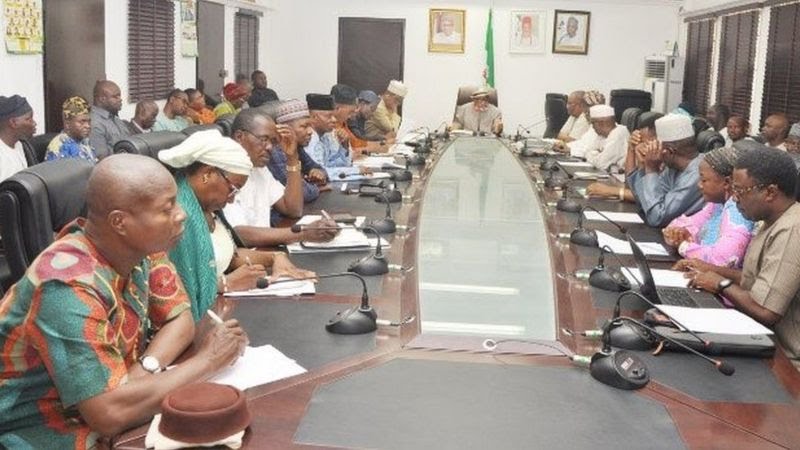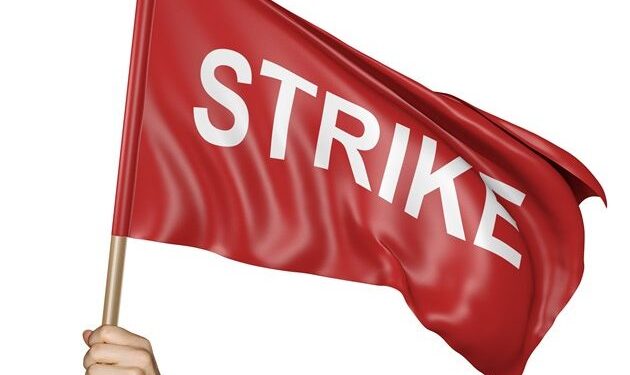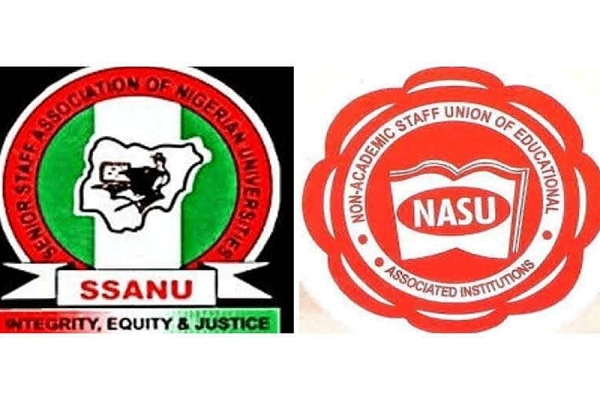Reports emerging from the congresses of the Academic Staff Union of Universities (ASUU) indicate that the union might be making plans to embark on an indefinite strike, barring last-minute intervention.
TheNewsGuru.com (TNG) reports that the latest meeting between ASUU and representatives of the federal government to address the demands of the union ended in a deadlock.
The union explained that the deadlock came into being because of a certain award of Consolidated University Academic Salary Structure (CONUASS) said to have been prepared by the National Salaries, Incomes and Wages Commission to it.
Following the meeting with the FG, branches of ASUU held congress to determine their position on the latest interaction with the government. It was gathered that over 123 branches of the union have concluded their congresses with others expected to round off today.
An ASUU leader, who declined to be named, told The Nation that a proposal for the indefinite strike would be ratified and adopted at the National Executive Council (NEC) meeting of ASUU scheduled for Sunday.
“None of the branches, including the University of Abuja, voted for anything other than an indefinite strike. All the branches of ASUU are expected to finish their congresses tomorrow (today) and pass their report to NEC. NEC will have to meet and review the decisions of all of the branches and decide on what to do,” the ASUU leader disclosed.
TNG reports that ASUU embarked on the ongoing strike on February 14th 2022. The union have on several occasions extended the industrial strike action, hinging the extension on the failure of the government to accede to their demands. While other tertiary institutions’ based unions have called off their strike, ASUU remains adamant.
ASUU strike: Stakeholders ask parties to settle by mutual agreements
Meanwhile, some concerned parents have asked both the FG and ASUU to settle the issues through mutual agreements to end the ongoing strike by the union. Also, an NGO, Noble Youths Mass Support Association (NYMSA) called on both parties to reach a workable and speedy resolution to enable students resume school.
Dr Swanta Banta, a parent and a public servant said that both ASUU and the Federal Government had some adjustments to make. According to her, it will not be a bad idea for the students to come together and sue the warring parties for treating them with contempt and disregard.
Banta, however, opined that when both parties meet in court, they should be able to resolve their issues with a mutual concession and some sort of reasoning that might consider the students’ predicament.
Banta said that it was unfortunate that the Federal Government seemed not to prioritise the education sector nor have ideas on how to raise money where ASUU was concerned. She said that the union was not left without blame and must make amends in its system of operations.
“It’s true that Nigeria is broke, but it’s also true that we have been borrowing money to meet up with certain obligations, some of which I consider frivolous and yet never for ASUU.
“Meanwhile, I also don’t totally sympathise with ASUU because our lecturers are partly responsible for the collapse of the standard of education. I really don’t see why they prefer to be on UTAS and not IPPIS.
“Enough of visiting many universities on part time teaching and receiving allowances, while the students are subjected to last minute crash programmes for the courses assigned these lecturers.
“Both ASUU and the Federal Government have some adjustments to make and must do so speedily and let our children resume school.”
Mr Akin Odunlade, another parent and a lawyer said that both parties had continued to benefit from the system and might have fallen apart somewhere “and unfortunately they are battling at the detriment of the students.’’
“They must patch the loopholes; where there are some sorts of irregularities, both parties must make a compromise at this stage and stop infringing on the rights of the students in the process.
“It has gotten out of hand and none of them is right or wrong at this stage but they would have to agree on something tangible to end the distress, which they have already caused both parents and their children.
“Not everyone can afford the luxury of a private institution, not with the present economic hardship please”.
Similarly, Mrs Sophie Moses, another parent urged the Federal Government to pay at least half of what it owed the union, saying “it is their right to work and be paid’’.
Moses said that if politicians were able to raise N100 million each for presidential candidacy in the upcoming general elections, it would not hurt to put such dedication and effort into the education sector.
“Unfortunately, some people are sitting on monies and have vowed to frustrate the efforts of these lecturers who are responsible for teaching our children.
“This back and forth is wasting the future of our children and it is not fair. It is the entitlement of these lecturers and I think they should just pay them for their hard work instead of letting the monies to be stolen by some greedy ones.”
Also reacting, Noble Youths Mass Support Association (NYMSA), an NGO, called on the Academic Staff Union of Universities (ASUU) and the Federal Government to reach a workable and speedy resolution to enable students resume school.
Mr Godwin Onmonya, the National Coordinator of the group told NAN that the strike was having negative impact on students and appealed for speedy resolution.
Omonya, however, called on the government to convene education confab to proffer adequate solution and help resolve the lingering universities workers strike.
“Our youths in public universities are losing their most active and creative years, while their parents are undergoing a painful agony of witnessing their children and resources waste away.
“We make this call in the overriding interest of our nation, but more particularly for the huge number of students, parents, academic and non-teaching staff in public universities across the country.
“Sadly, the children of most top government officials attend private universities or study abroad; they do not feel the distress and torment of the ordinary parents.
“We also want to call for a law mandating state actors and their nuclear families to attend only Nigerian institutions while in office.
“In addition, the government is also wasting our national resources because by the end of the strike, all academic staff and non-teaching staff would still receive their salaries,” he said.
However, Mr Silas Lagi, a parent in Gwagwalada Area Council, whose child is studying veterinary medicine at the University of Abuja, said that the strike had made his son shift focus to other things that he did not budget for.
“After each episode of strike, the children are no more focused and they end up not graduating within the stipulated years.
“My only pain is that the people in government are not feeling it because their own children are not in public schools but abroad or in private schools,” he said.
Meanwhile, ASUU Zonal Coordinator, Abuja, Dr Salawu Lawal, had earlier said there would be no resumption in public universities until “renegotiated 2009 agreement is signed, implemented and the University Transparency and Accountability Solution (UTAS) deployed.’’
The union had embarked on a nationwide warning strike from Feb. 14 to press home its demands, stressing that the action would continue until their demands were met.
The lecturers are demanding funding of the Revitalisation of Public Universities, Earned Academic Allowances, University Transparency Accountability Solution (UTAS) and promotion arrears.
Others are the renegotiation of the 2009 ASUU-FG Agreement and the inconsistency in Integrated Personnel Payroll Information System.
ASUU Strike: Students call for PPP to fund universities, recount losses
Meanwhile, some students affected by the strike, in separate interviews in Abuja, have appealed to the FG and ASUU to resolve their differences, as they suggest Public-Private Partnership (PPP) to fund the university system.
The students, who recounted losses caused by the six months strike by ASSU, continued to express serious concern about the situation, saying the long stay at home had inflicted permanent injury on them and damage to the education system.
Ms Philemon Kojo, a clinical student in the University of Abuja (UniAbuja), said that ASUU strike had become regular occurrence for many years for public university with prolonged academic years as the obvious effect.
Kojo suggested that for the issue to be resolved, ASUU and the education ministry should engage global monetary agencies to access funding or better still, the education sector should be privatised for proper management.
“The education sector should research into solutions that can lead us from a customer economy to productive economy, for example, vaccine and drug production, electronics and even energy generation.”
According to her, universities should begin to seek for grants from both privates sector, and international grants to assist in funding these universities.
“The ASUU strike has been tormenting me mentally and emotionally, especially as I see my counterparts in private institutions graduating and progressing with their lives.
“As a clinical year student, all my past efforts in clinical postings are thrown away because I have to repeat them on resumption.
“Imagine four months posting done prior to a six-month strike after which I have to repeat that same posting. It’s mentally depressing.
“Do I have to speak on the financial implications such as hostel rents wasted, traveling, foodstuffs thrown away and last but not the least, the time that can never be gotten back, especially in Nigeria where there are age limits to getting jobs.
“This is my 7th year in the university, for a six- year course but I’m just starting 500 level,” she said. ”
Another student of UNIABUJA, Mr Nwachukwu Cletus said there was need for good leadership “when the head is good every other part of the body will be alright, government should appoint leaders who will prioritise education and are well knowledgeable on how educational system should be managed.
Cletus also suggested that there should be optimal maximisation of production for universities as they must begin to look inward to maximise every factor of production at their disposal to contribute to their purse.
“Many universities have abundance and unutilised land which could be used for agricultural purposes, schools can go into food production like bread, snacks and sachet water which will contribute to their economy.
“Every nation doing well today invested heavily in their educational sector and any nation with good future is seen in how much they prioritise their educational system,’’ Cletus.
Mr Joseph Baker, a 300 level Biology Education student of UNIABUJA said the effect of the strike was overwhelming as it had delayed his anticipated plans.
Baker also suggested that government should consider PPP arrangement to fund education.
According to him, government alone cannot fund education; it has to seek the support of other bodies and international funding.
He, therefore, said that ASUU and the Federal Government should come to a sincere understanding and compromise for the sake of the future of the students and the country in general.
Baker, while calling on ASUU to reconsider its position, appealed to the Federal Government to pay ASUU an encouraging salary to maximise the impact of the education system for a better Nigeria.
On the strike, he said: “it has been delaying our educational lives, thereby, prolonging the accurate duration we are supposed to spend in our education.
“Most of our mates in private universities have gone farther than us who attend Federal universities just because of the ongoing strike.
“Also because of the prolonged sitting at home with our parents, sincerely most of us have been having one issue or the other with them.
“Some of us pick offense when being corrected by our parents due to frustration,” Baker said.
A 400 Level Linguistic student of Benue State University, Miss Eneh Edoh said that the strike had done more harm than good to students.
According to her, the strike has prolonged my stay in school. I should be a graduate by now thinking of serving and getting a job for myself.
“As a result of this strike, I am at home, an adage says, an idle mind is the devil’s workshop. Many young people have ventured into illicit acts, stealing, internet fraud and all sorts because of the idleness the strike has caused.’’
“Our house rents have expired and some will soon expire. The more we stay at home the more our brains are redundant.
“Some of us have planned our lives but the strike is taking us back. Something has to be done, the plans we have for our lives are at stake,” she said.
Another 400 Level student, Ms Ann Oriba, while speaking on the impact of the strike on education and students, said it had affected them both ways negativity.
“Our educational calendar has been extended beyond its curriculum. Also, with a break in learning, it has made studying much harder for me.’’
Meanwhile, National Association of Nigerian students (NANS), has reacted on the comment by the Minister of Education, Mallam Adamu Adamu that ASUU should be held liable for students wasted time
The National President of NANS, Mr Sunday Asefon argued that ASUU was neither the proprietor of tertiary institutions nor the beneficiary of the exorbitant fees we pay across tertiary institutions in Nigeria.
“Our attention has been drawn to a statement credited to the Minister of Education Malam Adamu Adamu, where he suggested that Nigerian students affected by ASUU strike must sue ASUU for liabilities suffered as a result of the strike.
“Perhaps the only thing Malam Adamu Adamu has gotten right in this saga, is the fact that Nigerian students need to be compensated for their wasted time, opportunities and resources.
“However, the minister is clever by half by suggesting ASUU should be held liable for the liabilities.
“ASUU is neither the proprietor of our tertiary institutions nor the beneficiary of the exorbitant fees; we pay across our tertiary institutions in Nigeria.
“It is an abuse of our intellects to suggest that students should sue employee for protesting bad working conditions and not the employer who is the proprietor of our schools and the beneficiary of the exorbitant school fees we pay,” he said.
The national president however called on ASUU to be considerate and put the interest of students as their priority, saying that ASUU was holding the nation to ransom was unpatriotic and self-serving.
In the same vein, Secretary, Workers and Youths Solidarity Network (WYSN), Damilola Owot said the strike action had caused disruptions not only in the educational sector but also in the general economic system.
“Imagine traders, bus drivers, bike men, barbers, hairdressers and computer venture operators who rely heavily on tertiary institutions for sales and patronage have been left in very pitiable and vulnerable state.
“What about the landlords of the students whose rents have expired? Some of these landlords depend on the rents for their survival too.
“Would they force-open the doors, pack students load outside and rent the rooms out to other persons? What is the fate of the students who have lost six months of their lives to the crisis in the education sector?
“While some students have braced up and turned into impromptu online vendors, some are struggling to learn as apprentices under very harsh conditions,” he said.
Mrs Vivian Bello, Convener of Save the Children campaign said that the strike had made students to pressed hard for survival in the face of educational uncertainties.
“Some have taken to anti-social engagements that could forever mar their lives and destines.
“As we know with young people, once their minds derail, it takes far-reaching struggle to return same back to the path of rectitude. The protracted strike and government authorities’ seeming nonchalance has simply lent weight to this tendency.
However, the Congress of University Academics (CONUA) who differs with some stakeholders on the ASUU strike called on the Federal Government to liberalise university unions by recognising and registering other unions.
The National Coordinator of CONUA, Dr Niyi Sunmonu, said that liberalisation of academic unions would end incessant strikes in universities.
He said the liberalisation would also engender cross-fertilisation of ideas, nurture healthy competition and protect the interests of all stakeholders.
He said CONUA was poised to ensure cross-fertilisation of ideas that took place before a strike could be embarked upon.
“What we have noted over the years is that ideas are usually muffled,’’ he said.
Sunmonu stressed that there was nothing wrong in having two to four unions in universities as the 1999 Constitution assures of freedom of association.
Also, CONUA’s National Publicity Coordinator, Dr Ernest Nwoke said the monopoly enjoyed by ASUU had been responsible for incessant strikes in universities.
He stressed that the liberalisation of academic staff unions in the universities was the only solution so that lecturers would be free to belong to unions of their choices.
“For more than 40 years ASUU has enjoyed a monopoly in Nigerian universities.
“There is no ripe time than now for the liberalisation of academic unions to put an end to strikes in the universities,’’ he said.
Meanwhile, some university workers under the aegis of the Senior Staff Association of Nigeria Universities (SSANU) and the Non-Academic Staff Union of Allied and Education Institutions (NASU) have suspended their almost five-month old strike for two months.
The industrial action, which was called off on Saturday after a brief meeting between the leadership of both unions and the Minister of Education, Adamu Adamu in Abuja, is expected to take effect from on Aug. 24.
In spite of calling off the strikes by these labour unions, activities in the public universities are expected to still be paralysed as ASUU insists on going ahead with the strike.
According to a monitored Channels Television report, the Adamu said that the Federal Government had committed N50 billion to pay earned allowances for members of SSANU, NASU, and ASUU.
Strike: “Anti-ASUU people” criticising lecturers out of ignorance – Don
Dr Muhammad Sajo, a University lecturer, has accused “anti-ASUU people” for casting aspersion on the Academic Staff Union of University (ASUU), “out of ignorance of the university system”.
Sajo, a lecturer with the Department of English and Literary Studies, Usmanu Danfodiyo University, Sokoto (UDUS), spoke in Sokoto on Sunday.
Sajo said: ”The anti-ASUU people’s sheer ignorance of the ASUU struggle itself, or based on their envy of the ample opportunities the global university system accords academics which others out of the system don’t have.
“However, time will tell when ASUU retires to the pursuit of mainly its members’ welfare packages. Hence, leaving the public with the government to protest the imminent exorbitant tuition fees likely to be imposed on the system,” he said
The don added that a section of ASUU members differed within the union in the area of emphasising on the pursuit of members’ welfare, rather than facing the fight ”which isn’t theirs.”
“Nigeria’s degree programme is the cheapest globally and save for corruption which impedes the nation’s growth.
“The country can afford to give free university education or sustain its subsidy to especially, children of the masses which is the main reason for the ASUU’s struggles.
“People should note that the current ASUU strike is the mother of all strikes which we support because, it is the one which specifically encapsulates members’ welfare package.
“This is from the little stipends being on the payroll for over a decade,” he added.
On the ‘no work, no pay’ slogan by the government, Sajo said ”many people speak ignorantly by supporting the position on the matter.
“This is not knowing that academics don’t eat free salary, no matter how long they stay off the class due to the strike.
“If ASUU agrees on the position, about 5 sets of students from undergraduate to postgraduate levels won’t graduate.
“For those who aren’t aware, an academic in the system is employed to render three services: teaching, research and community service.
”During ASUU strike, only one of the three is rested, i.e. the teaching component,” he said.
The lecturer further said he was of the view that not only the latest issue of the ‘no work no pay’ slogan, the entire issues can be resolved within a day, ” if there is political will by the government.
“It is a fact that since time immemorial, before any ASUU strike is suspended, the union often exhibits the gesture of shifting grounds in the interest of the public.
“However, while doing so, at the moment, ASUU’s members shouldn’t be allowed to suffer casualties from actions of certain sections of the people who are wielding the sticks of power,” he added.









